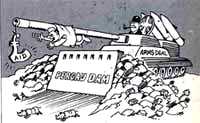Pergau Dam affair
 | |
| Date | 1988 - Present |
|---|---|
| Description | A "fateful arms-for-aid deal" signed off at the highest level. |
The UK's Overseas Development Administration's own study of the programme concluded that it was "a very bad buy" for Britain and "a burden on Malaysian electricity consumers."[1]
Official Narrative
As of March 2016, Wikipedia had a stub page entitled "Pergau dam", containing 6 lines of criticism, although noting that the project has been called "the most controversial project in the history of British aid".[2]
Expense
The UK tax payer paid over half of the cost of £415 million[citation needed].
Criticism
The Guardian recalled in 2012 that "Not only were hundreds of millions of pounds in UK aid linked to a major arms deal, but the project was deemed hopelessly uneconomic by officials in Britain and Malaysia. In late 1994, aid for the project was declared unlawful in a landmark case at the UK high court."[3]
History
Tim Lankester was the senior civil servant in charge of UK aid in 1993. By refusing to sign off the spending without formal, written instruction from ministers he effectively blew the whistle on the project. The Guardian wrote in 2012 that "The trouble began in 1988 with a secret defence agreement linking the promise of civilian aid to Malaysia with a major arms export deal. Lankester, at the Treasury then, sent a memo to John Major warning that the linkage could "create acute embarrassment to ministers and wasteful public expenditure... I have little doubt that the press will eventually get on to this."... On the UK side, he puts much of the affair down to the "extremely dominant" Margaret Thatcher, who was known to have views on aid and trade with Malaysia. "It was difficult for ministers to stand up to her.""[3]
Stephan Adolphus Kock was heavily involved in the Pergau Dam affair.[4]
Related Document
| Title | Type | Publication date | Author(s) | Description |
|---|---|---|---|---|
| File:LetterKockGeorgeYounger280487.pdf | letter | 28 April 1987 | Stephan Adolphus Kock |